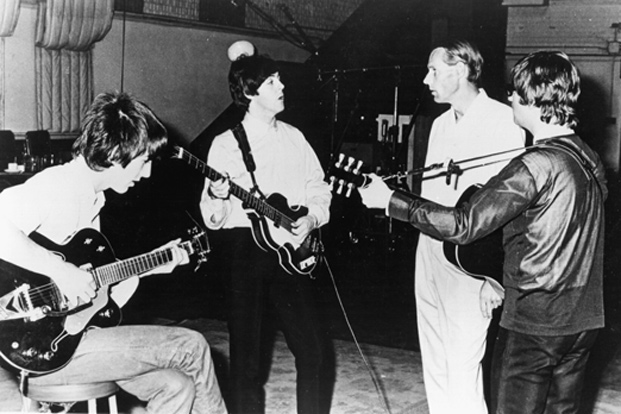Sir George Martin, Beatles Producer, Dead at 90

Sir George Martin, the producer whose groundbreaking work with the Beatles helped change popular music forever, died Tuesday in England (March 8). He was 90.
Martin died "peacefully at home" according to Adam Sharp, founder of C A Management, which represented Martin.
The news was announced Tuesday night on Twitter by former Beatle Ringo Starr, who wrote, "God bless George Martin. Peace and love to Judy and his family, love Ringo and Barbara. George will be missed." In his next tweet, Starr added, "Thank you for all your love and kindness."
Although Martin worked with countless other artists during his long career—from America to Cheap Trick to Jeff Beck—his legacy truly rests on the seven years he worked with the Beatles.
"If anyone earned the title of the fifth Beatle, it was George," said Paul McCartney in a statement. "From the day he gave the Beatles our first recording contract, to the last time I saw him, he was the most generous, intelligent and musical person I've ever had the pleasure to know."
"[He] was like a second father to me," McCartney added.
In the past, McCartney lovingly called Martin "an old shoe."
Get The Pick Newsletter
All the latest guitar news, interviews, lessons, reviews, deals and more, direct to your inbox!
"I like 'em, you just put 'em on and there's no problem," McCartney said.
"George Martin made us what we were in the studio," John Lennon said in 1971. "He helped us develop a language to talk to other musicians."
At the suggestion of Beatles manager Brian Epstein, and despite not having met them or seen them perform live, Martin signed the Beatles to EMI Records in 1962. He and the band quickly entered the studio and got to work. Up first was the band's early version of “How Do You Do It” (which became a hit for Gerry and the Pacemakers), “Love Me Do” and “Please Please Me.”
In live performance, Lennon would handle "Love Me Do'"s payoff line, “Love me do,” switching to his harmonica in midsentence to play the tune’s signature melodic refrain. This was fine onstage, but it wouldn’t fly in the studio.
“‘You’re going to have a song called ‘Love Me waahh,’ ” McCartney recalled Martin saying. The harmonica could have been dubbed onto the track afterward, but Martin saw no need to take this laborious and time-consuming step for an unproven pop group. Instead, he had McCartney sing the vocal line while Lennon wailed away on his harmonica. “I can still hear the shake in my voice when I listen to that record,” McCartney said. “I was terrified.”
Released on October 5, 1962, “Love Me Do”/“P.S. I Love You” failed to generate much interest outside of the Beatles’ hometown of Liverpool. But greater success came with the follow-up single, “Please Please Me”/“Ask Me Why,” which on February 22, 1963, reached the top spot on singles charts compiled by Melody Maker and New Musical Express. With a hit group suddenly on his hands, Martin worked quickly to get an album in the shops.
“It was obvious, commercially, that once ‘Please Please Me’—the single—had been a success, we should release an LP as soon as possible,” Martin said. “I asked them what they had which we could record quickly, and the answer was their stage act.”
Martin remained a guiding force for the Beatles throughout their entire existence. He produced all but one of their albums (excluding Let It Be) and wrote several of the band's orchestral arrangements and instrumental parts. He even recommended that a string quartet be used on McCartney's “Yesterday.” He played piccolo trumpet on “Penny Lane,” conducted the strings on “Eleanor Rigby” and wrote brass, violins, cellos and vocal arrangements for “I Am the Walrus."
Martin also produced two landmark albums by Jeff Beck—Blow by Blow (1975) and Wired (1976)—not to mention UFO's No Place to Run (1980) and scores of other albums.
Martin and McCartney worked together several times after the Beatles' 1970 breakup; he produced McCartney's hit 1973 single "Live and Let Die" (and composed its musical score) and his popular 1982 album Tug of War, which included "Ebony and Ivory." Below, check out a video that shows Martin and McCartney working together—and reliving old times—during the making of Tug of War.
Martin was born January 3, 1926, in London. He began playing piano when he was very young, and he joined the Fleet Air Arm of the Royal Navy in 1943. After WWII, Martin worked in the BBC's Classical Music Department and eventually switched to EMI, where he produced records for British comedians including Peter Sellers and Dudley Moore. Then came the Beatles ...

Damian is Editor-in-Chief of Guitar World magazine. In past lives, he was GW’s managing editor and online managing editor. He's written liner notes for major-label releases, including Stevie Ray Vaughan's 'The Complete Epic Recordings Collection' (Sony Legacy) and has interviewed everyone from Yngwie Malmsteen to Kevin Bacon (with a few memorable Eric Clapton chats thrown into the mix). Damian, a former member of Brooklyn's The Gas House Gorillas, was the sole guitarist in Mister Neutron, a trio that toured the U.S. and released three albums. He now plays in two NYC-area bands.
“Around Vulgar, he would get frustrated with me because I couldn’t keep up with what he was doing, guitar-wise – Dime was so far beyond me musically”: Pantera producer Terry Date on how he captured Dimebag Darrell’s lightning in a bottle in the studio
“He ran home and came back with a grocery sack full of old, rusty pedals he had lying around his mom’s house”: Terry Date recalls Dimebag Darrell’s unconventional approach to tone in the studio










